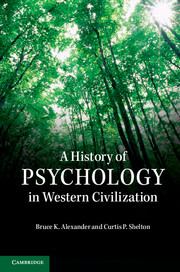Book contents
- Frontmatter
- Dedication
- Contents
- List of figures
- List of tables
- Preface
- Acknowledgements
- 1 Introduction: Two histories of Western psychology
- 2 Rationalism: Plato and the “just” person
- 3 Stoicism: Marcus Aurelius and the sufficient self
- 4 Christianity: St. Augustine and the incomplete soul
- 5 Materialism: Thomas Hobbes and the human machine
- 6 Empiricism: John Locke, David Hume, and experience as reality
- 7 Evolution: Charles Darwin and Homo sapiens as a work in progress
- 8 Medicine: Sigmund Freud and the world of neurotics
- 9 Re-imagining psychology
- Appendix A Plato’s nature of intelligence and other faculties
- Appendix B The search for Aunt Lena
- Index
- References
3 - Stoicism: Marcus Aurelius and the sufficient self
Published online by Cambridge University Press: 05 July 2014
- Frontmatter
- Dedication
- Contents
- List of figures
- List of tables
- Preface
- Acknowledgements
- 1 Introduction: Two histories of Western psychology
- 2 Rationalism: Plato and the “just” person
- 3 Stoicism: Marcus Aurelius and the sufficient self
- 4 Christianity: St. Augustine and the incomplete soul
- 5 Materialism: Thomas Hobbes and the human machine
- 6 Empiricism: John Locke, David Hume, and experience as reality
- 7 Evolution: Charles Darwin and Homo sapiens as a work in progress
- 8 Medicine: Sigmund Freud and the world of neurotics
- 9 Re-imagining psychology
- Appendix A Plato’s nature of intelligence and other faculties
- Appendix B The search for Aunt Lena
- Index
- References
Summary
Marcus Aurelius (AD 121–180) was the renowned emperor of Imperial Rome from AD 161 until his death. However, his civic virtues and military victories will scarcely be mentioned in this chapter since Marcus Aurelius’ place in psychology comes from his only book, now known as the Meditations. The perspective on psychology described in the Meditations has long been influential in Western civilization and appears to be having a major resurgence at the beginning of the twenty-first century. The essence of Marcus Aurelius’ Stoic perspective on psychology is that if people adopt a few basic principles of living, they will have everything they need for coping with life’s travails with serenity, virtue, and a degree of happiness.
Much as Plato inspired philosophical movements in the ancient world called “Platonism” and later “Neoplatonism,” Marcus Aurelius became a leading figure in a philosophical movement called “Stoicism,” which had had a centuries-long history prior to his lifetime. By his time, the goals of “late Stoicism” had been narrowed down to a philosophy of life that laid out the rules for virtue and happiness (Hays’ Introduction in Aurelius, circa AD 170/2003, pp. xx–xxxv). Two other late Stoic writers still celebrated today are Seneca (circa AD 64/1969) and Epictetus (see Seddon, 2005). With the aid of Marcus Aurelius’ powerful and moving writing, late Stoicism was much more than just an academic philosophy; it became the philosophy of some of Rome’s great leaders, including some of its emperors. Late Stoicism:
… became the true religion of the educated classes [in Rome]. It furnished the principles of virtue, coloured the noblest literature of the time, and guided all the developments of moral enthusiasm.
(Lecky, 1913, Vol. 1, p. 229)- Type
- Chapter
- Information
- A History of Psychology in Western Civilization , pp. 98 - 133Publisher: Cambridge University PressPrint publication year: 2014



